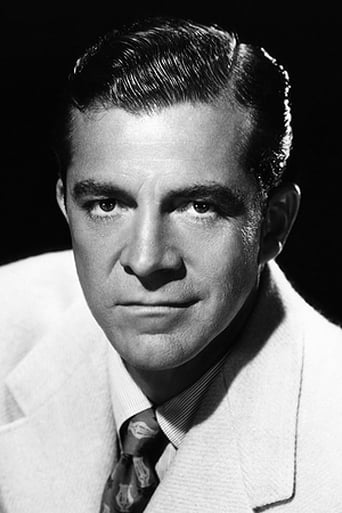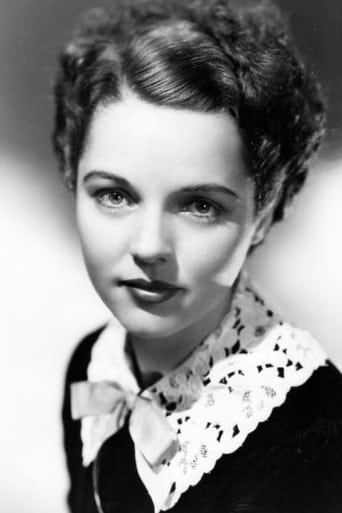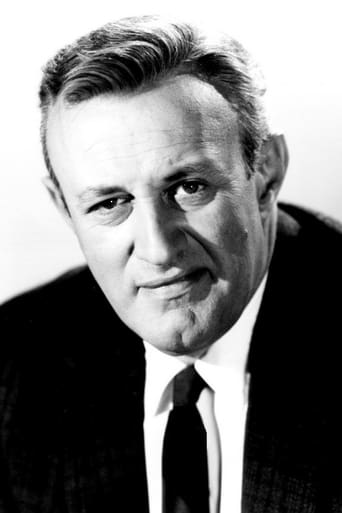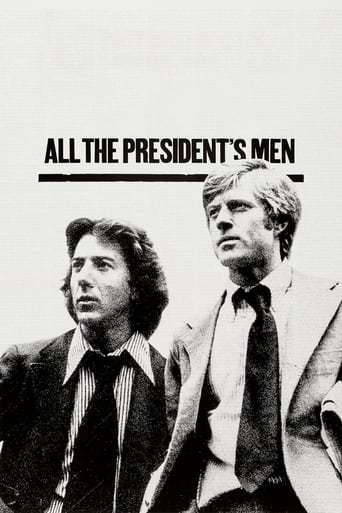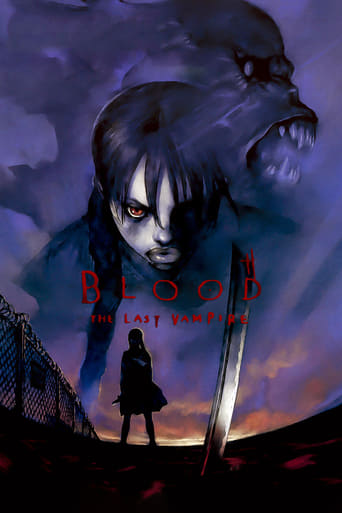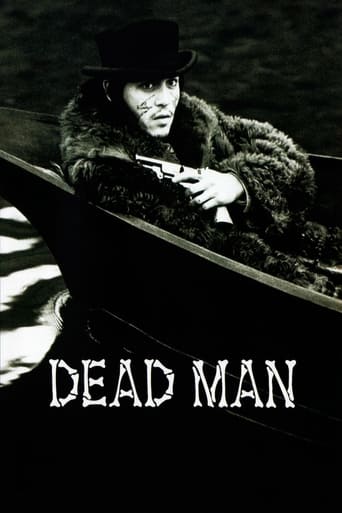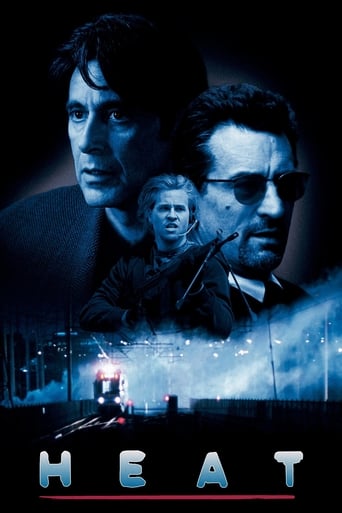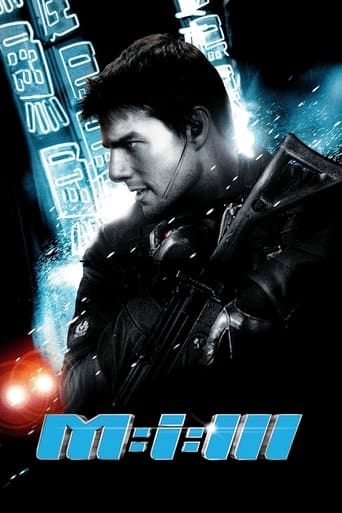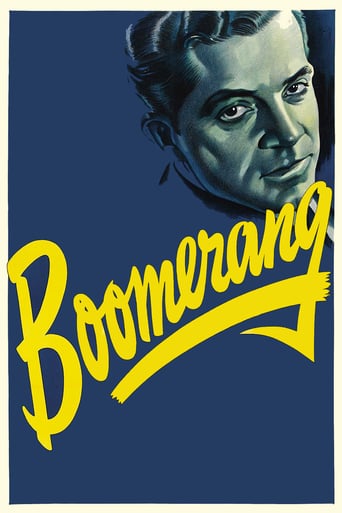
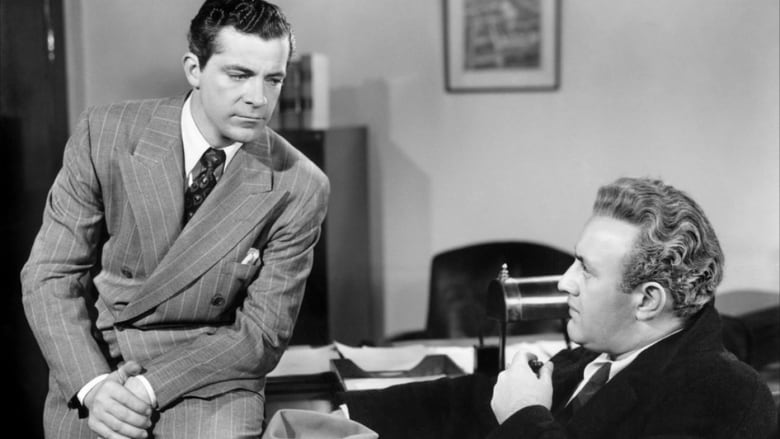
Boomerang! (1947)
In a quiet Connecticut town, a kindly priest is murdered while waiting at a street corner. The citizens are horrified and demand action from the police. All of the witnesses identify John Waldron, a nervous out-of-towner, as the killer. Although Waldron vehemently denies the crime, no one will believe him. District Attorney Henry Harvey is then put on the case and faces political opposition in his attempt to prove Waldron's innocence. Based on a true story.
Watch Trailer
Cast


Similar titles
Reviews
A beloved Protestant Episcopal minister, Father George Lambert (Wyrley Birch), is shot to death at night while lighting his pipe on a city street. A man in a white hat and a dark trench coat runs away. In brief flashback we see several kooks who may be the murderer. After many days there is no break in the case as the political pressure intensifies and the local citizen's committee demands action. State Attorney Henry Harvey (Dana Andrews) and Police Chief Robbie Robinson (Lee J. Cobb) feel the heat. Police Commissioner James (Ben Lackland) perturbs Robinson, who threatens to quit. There are also those politicians who want Harvey to look badly. Trying to ridicule the reform administration currently in power, the local newspaper ("Morning Record") screams a headline: "Report Police Dept. Under Fire From State House." The same newspaper runs editorial cartoons about the blind leading the blind. Finally a vagrant who possibly matches a sketchy description is picked up in Ohio and extradited to Connecticut. He is identified in a police line-up by several witnesses. Under an intense and grueling two-day interrogation by such folks as Detective Lt. White (Karl Malden), the man (John Waldron = Arthur Kennedy) cracks and confesses to the crime. Ballistics tests say that the bullet lodged in Father Lambert's brain came from Waldron's handgun. It appears to be an open and shut case.But when Harvey speaks to Waldron behind bars, he begins to have doubts about Waldron's guilt, even though the suspect is angry and unstable (and, as we have seen, had an altercation with the priest earlier). Harvey remembers the Lawyers' Code of Ethics that justice is more important than conviction. Consequently, at the indictment hearing, although the state attorney lays out a course that appears leading to a deposition of guilt, Harvey in fact states that the suspect is innocent ("nolle prosequi"). The courtroom erupts, immeasurably displeasing the judge, who is also unhappy with Harvey, as is Robinson. The judge, believing that Harvey is being pressured by political chicanery, warns about possible malfeasance and disbarment. Harvey is risking his reputation. There is another angle. Paul Harris (Ed Begley) wants a conviction so that his party will be assured of an election victory. Harris owns the Sunset Realty Company, which is trying to sell ten acres of land to the city for the charitable Project for Recreational Center (for children). If his party does not win the election, the city will not approve of the purchase and Harris will be financially ruined. Complicating matters is that Harvey's dutiful (and attractive) wife, Madge (Jane Wyatt) is an altruistic volunteer Chairman of the Project. Although she is not privy to the schemes of Harris, he threatens to implicate her; it will look bad in the newspapers. Harris even pulls out a handgun and threatens Harvey (Yikes, only in Hollywood!). On the second day of the indictment session, Harvey requests that he call in witnesses, not prohibited but unusual. He shows the inconsistencies of the statements of the witnesses, with at least one with an agenda. Harvey also demonstrates that the police ballistics testing was incorrect. Seeing his ruin, Harris takes out his handgun and commits suicide. Case dismissed. The newspaper reads: "Waldron Freed" and "Harvey Exonerates Murder Suspect." Meanwhile a possible suspect perishes in an automobile crash. By the way, the case was never solved.The movie was based upon the murder of a popular Catholic priest (not a Protestant minister), Father Hubert Dahme, in 1924 in Bridgeport, Connecticut. That case too was never solved. As Bridgeport would not cooperate with filming, the movie was shot in nearby Stamford. It is interesting to note that the state attorney (Homer Cummings, a Democrat) on that case became the nation's attorney general in the Roosevelt Administration. Ably directed by Elia Kazan, this realistic and hard-hitting drama is one of the best films of the year. Dana Andrews, an intense actor, stars as a lawman with a deep conscience. Jane Wyatt, whose career began in the 1930s, would later star (as Margaret Anderson) with Robert Young in the popular "Father Knows Best" TV series (1954-1960). Top portrayals were also delivered by proved performers Arthur Kennedy, Lee J. Cobb, Ed Begley, and Karl Malden.
BOOMERANG! certainly kicks off with a bang, as in the opening scene a priest is murdered by being shot at point blank range in the head. The subsequent narrative involves the efforts of the various law enforcement agencies to bring the murderer to justice, with the hook being that the whole thing is based on a true life case.And it's a decent film, very well made, and one which tells a thoroughly engaging storyline on top. A youthful Arthur Kennedy makes a big impact as the number one murder suspect who may or may not be guilty of the time, and the whole second half of the film is an electrifying courtroom drama as the district attorney attempts to prove his innocence in the face of overwhelming opposition.BOOMERANG! stars the ubiquitous Dana Andrews in one of his most subtle turns as the crusading lawyer and he's supported by a solid cast. Lee J. Cobb is the gruff cop, Karl Malden is a junior detective, and Cara Williams a femme fatale type character. There's even a cameo appearance from playwright Arthur Miller. A combination of Elia Kazan's assured direction and plenty of solid storytelling make this a gripping film noir.
Although the real event the film is based on takes place after WWI, the setting around 1945 does a fine job of conveying the essence of the story. Using locations rather than sets in most cases added to the authenticity of the drama. Not "Noir" enough, the harsh lighting attempted on some of the indoor scenes added little effect. The hysteria of the public was overly characterized and the brutality of the police (although close to the truth) could have been much more dramatic.When the DA thoughtlessly opens a book conveniently placed on a side table and reads a guide to behavior, I laughed at the sentimentality.Over all, the film does an excellent job of telling current viewers about the culture of the 1950s. Political power, police ineptness, the position of women, even the unspeakable (what was it the priest could not forgive?). As a morality play, the concept of any doubt of guilt (and hence - innocence) is well established.As for the acting, my vote goes for Jane Wyatt. The newspaper man, Sam Levene (hammering away at the typewriter with two fingers) also had a redeeming quality and humor. The others in most cases were at times either too deadpan or consistently over acted (the wealthy businessman for example).
The audience is in on the revelation as to who killed a beloved priest almost from the very beginning of this classic film noir. The mass media manipulates the public into slamming the local police force in this quaint Connecticut city to find a suspect, harassing the innocent of being shoved into a line-up then finally arresting a man found in Ohio with a gun who matches the suspect's description and just happened to have just been there weeks before. Local politics is examined as the pressure cooker environment of the law turns everything upside down. Prosecutor Dana Andrews stuns the public by announcing in court that he believes that the suspect (a wonderful Arthur Kennedy) is innocent, jeopardizing his own career which includes an endorsement for governor.The ruthlessness of the headline hungry press and the frustrations of the hands tied behind their back law enforcement keeps this one of the most nail-biting post war problem dramas. Personal ambitions take over idealistic men and tension increases as the case becomes a hot plate of controversy. Director Elia Kazan gives the documentary like presentation a gritty feel as the community, lovely to look at for outsiders, becomes truly ugly as its inner wheels are exposed. Andrews headlines an excellent cast with Jane Wyatt as his supportive wife, Lee J. Cobb brilliant as the tough police chief, Karl Malden as an investigator who brutally rides Kennedy during questioning, and Sam Levene as a relentless reporter. The identity of the killer is never in doubt with the audience, with the sullen face of the creepy character looking on in court with a self-satisfied but worried smirk on his face."Boomerang" will make you think of times in our recent history where the public makes up their mind about a situation without knowing all the facts or simply just to keep in line with everybody else. Public opinion, as we all know, isn't always justified. It is those who stand up to adversity because of their objections towards public opinion who make the true difference in our democracy. If only law makers and politicians could follow in the footsteps of Andrews and follow their hearts rather than the men with fat wallets, our world would be a much more honest place.


